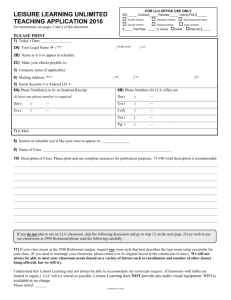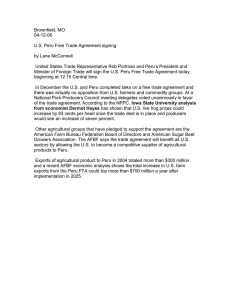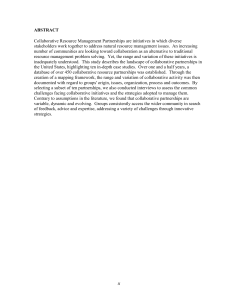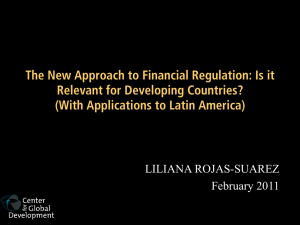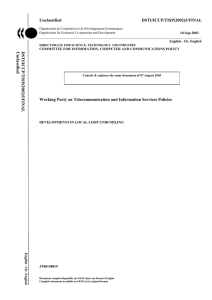ABSTRACT: 2014 ELAM Institutional Action Project Poster Symposium
advertisement
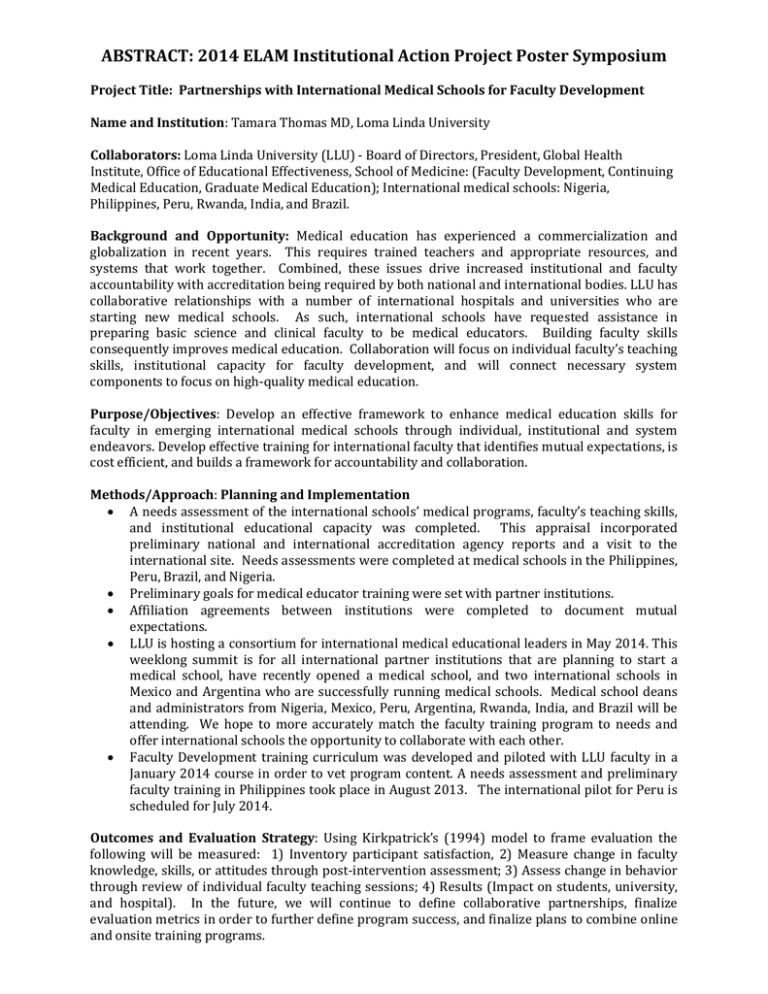
ABSTRACT: 2014 ELAM Institutional Action Project Poster Symposium Project Title: Partnerships with International Medical Schools for Faculty Development Name and Institution: Tamara Thomas MD, Loma Linda University Collaborators: Loma Linda University (LLU) - Board of Directors, President, Global Health Institute, Office of Educational Effectiveness, School of Medicine: (Faculty Development, Continuing Medical Education, Graduate Medical Education); International medical schools: Nigeria, Philippines, Peru, Rwanda, India, and Brazil. Background and Opportunity: Medical education has experienced a commercialization and globalization in recent years. This requires trained teachers and appropriate resources, and systems that work together. Combined, these issues drive increased institutional and faculty accountability with accreditation being required by both national and international bodies. LLU has collaborative relationships with a number of international hospitals and universities who are starting new medical schools. As such, international schools have requested assistance in preparing basic science and clinical faculty to be medical educators. Building faculty skills consequently improves medical education. Collaboration will focus on individual faculty’s teaching skills, institutional capacity for faculty development, and will connect necessary system components to focus on high-quality medical education. Purpose/Objectives: Develop an effective framework to enhance medical education skills for faculty in emerging international medical schools through individual, institutional and system endeavors. Develop effective training for international faculty that identifies mutual expectations, is cost efficient, and builds a framework for accountability and collaboration. Methods/Approach: Planning and Implementation • A needs assessment of the international schools’ medical programs, faculty’s teaching skills, and institutional educational capacity was completed. This appraisal incorporated preliminary national and international accreditation agency reports and a visit to the international site. Needs assessments were completed at medical schools in the Philippines, Peru, Brazil, and Nigeria. • Preliminary goals for medical educator training were set with partner institutions. • Affiliation agreements between institutions were completed to document mutual expectations. • LLU is hosting a consortium for international medical educational leaders in May 2014. This weeklong summit is for all international partner institutions that are planning to start a medical school, have recently opened a medical school, and two international schools in Mexico and Argentina who are successfully running medical schools. Medical school deans and administrators from Nigeria, Mexico, Peru, Argentina, Rwanda, India, and Brazil will be attending. We hope to more accurately match the faculty training program to needs and offer international schools the opportunity to collaborate with each other. • Faculty Development training curriculum was developed and piloted with LLU faculty in a January 2014 course in order to vet program content. A needs assessment and preliminary faculty training in Philippines took place in August 2013. The international pilot for Peru is scheduled for July 2014. Outcomes and Evaluation Strategy: Using Kirkpatrick’s (1994) model to frame evaluation the following will be measured: 1) Inventory participant satisfaction, 2) Measure change in faculty knowledge, skills, or attitudes through post-intervention assessment; 3) Assess change in behavior through review of individual faculty teaching sessions; 4) Results (Impact on students, university, and hospital). In the future, we will continue to define collaborative partnerships, finalize evaluation metrics in order to further define program success, and finalize plans to combine online and onsite training programs. Partnerships with International Medical Schools for Faculty Development Tamara Thomas MD, Professor, Emergency Medicine, Vice Dean, Academic Affairs, School of Medicine, Loma Linda University Mentors: Daniel Giang MD, Roger Hadley MD, Larry Loo MD, Global Health Institute, Richard Hart MD Background Opportunity Discussion Medical education has experienced a commercialization and globalization in recent years. This requires trained teachers, appropriate resources, and systems that work together. Combined, these issues drive increased accountability with accreditation of institutions and faculty being required by both national and international bodies. Loma Linda University (LLU) has collaborative relationships with a number of international hospitals and universities who are starting new medical schools. As such, international schools have requested assistance in preparing basic science and clinical faculty to be medical educators. Building faculty skills consequently improves medical education. Collaboration will focus on individual faculty’s teaching skills, institutional capacity for faculty development, and connecting necessary system components to focus on highquality medical education. The recent worldwide expansion of medical education training programs requires adequate numbers of qualified faculty. Developing faculty skills and educational leadership is essential to the future success of a medical school. LLU’s initial collaborative partnerships are with four new medical schools in Nigeria, Philippines, Peru, and Brazil. Initial steps have focused on creating a simple and sustainable framework that meet the institutions’ faculty development needs and can be further built upon in the future. • Meet with LLU leaders, board members • Meet with international medical school leaders • Set preliminary goals and expectations • Affiliation agreements Assessing needs • Explore current situation • ID desired situation & gaps • ID priorities, challenges & opportunities • Potential interventions • Pilot program at LLU January 2014 • Consortium for international medical education leaders for all partner institutions, May 2014 • Initial pilot Peru July 2014 Building partnerships Implementing programs Purpose The purposes of the initiative are to: • Develop an effective framework to enhance medical education skills for faculty in emerging international medical schools through individual, institutional and system endeavors. • Develop training for international faculty that identifies mutual expectations, is cost efficient, and builds a structure for accountability and collaboration. Approach • A needs assessment of the international schools’ medical programs, faculty’s teaching skills, and institutional educational capacity was completed. This appraisal incorporated preliminary national and international accreditation agency reports and a visit to the international site. Needs assessments were completed at medical schools in the Philippines, Peru, Brazil, and Nigeria. • Preliminary goals for medical educator training were set with partner institutions. • Affiliation agreements between institutions were completed to document mutual expectations. • LLU is hosting a consortium for international medical educational leaders in May 2014. This weeklong summit is for all international partner institutions that are planning to start a medical school, have recently opened a medical school, and two international schools in Mexico and Argentina who are successfully running medical schools. School deans and administrators from Nigeria, Mexico, Peru, Argentina, Rwanda, India, and Brazil will be in attendance. We hope to more accurately match the faculty training program to needs and offer international schools the opportunity to collaborate with each other. • Faculty Development training curriculum was developed and piloted with LLU faculty in a January 2014 course in order to vet program content. A needs assessment and preliminary faculty training in Philippines took place in August 2013. The international pilot for Peru is scheduled for July 2014. Outcomes & Evaluation Strategy Using Kirkpatrick’s (1994) model to frame evaluation the following will be measured: 1) Inventory participant satisfaction, 2) Measure change in faculty knowledge, skills, or attitudes through post-intervention assessment; 3) Assess change in behavior through review of individual faculty teaching sessions; 4) Results (Impact on students, university, and hospital). In order to explore overall faculty skills and capacity, needs assessments queried individual faculty’s teaching skills, institutional capacity for faculty development, and will connect necessary system components. The needs assessments show faculty development to be the largest need in all four international medical schools. The new medical programs are being challenged to implement competency-based medical education with problem-based learning for their students without experienced faculty to carry it out. This educational format necessitates different expertise and skills than the more traditional lecture-based teaching as well as faculty with appropriate training. Participating medical schools have found a significant added value in the ability to connect with each other and exchange experiences, information, and best practices. Developing partnerships to generate a framework for faculty development will create a need for further definition of collaborative relationships within their own universities, regional educational environment, national as well as international levels. Summary Next steps will include further defining of the collaborative partnerships, finalizing evaluation metrics in order to further define program success, and continuing plans to combine online and onsite training programs. References 1) Burdick WP, Diserens D. Friedman SR et al: Measuring the effects of an international health professions faculty development fellowship: the FAIMER Institute. Med Teach 2010; 32:414-21. 2) Burdick WP, Campos H, Norcini J: A model for linkage between health professions and health: FAIMER international faculty development initiatives. Med Teach 2011;33:632-37. 3) Steinert Y, Mann K, Centeno A, et al: A systematic review of faculty development in initiatives designed to improve teaching effectiveness in medical education. Med Teach 2006;28: 497-526. Acknowledgments LLU, LLUSM and contributed expert advice and valuable insights to this initiative. Presented at the 2014 ELAM® Leaders Forum.
